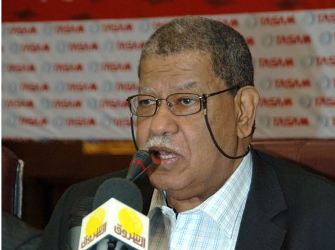DUP minister denies reports of his resignation
By Tom Law
May 8, 2012 (LONDON) – Sudan’s State Minister for Foreign Affairs Mansour Youssef Al-Ajab, a member of the Democratic Unionist Party (DUP), has denied allegations that he has left the government.

Al-Sahafah newspaper, a Khartoum-based Arabic daily, reported on Saturday – quoting an anonymous DUP source – that the Al-Ajab had handed in his resignation to the party’s leader Mohamed Osman Al-Mirghani in protest against his “marginalisation” within the foreign ministry. The allegations were intended to undermine Al-Mirghani’s leadership, according to Al-Ajab.
Al-Mirghani’s DUP joined the National Congress Party (NCP) government of president Omar Hassan Al-Bashir in December last year, despite reports of internal dissent and against the wishes of Sudan’s other main opposition parties who have formed an alliance to try and end Bashir’s 22-year rule.
Al-Ajab’s appointment as state minister for foreign affairs, serving under senior NCP figure Ali Karti, was a consequence of the NCP-DUP deal.
The DUP-aligned minister denied the Al-Sahafah reports that he was being marginalised with the foreign ministry, pointing out that he attended the recent Tokyo International Conference on African Development (TICAD) in Rabat, Morocco on behalf of the government.
He said that he held an hour-long meeting with the Japanese foreign minister Koichiro Genba on how to achieve peace in Sudan. As well as internal conflicts in Darfur since 2003, South Kordofan and Blue Nile since 2011 there have been serious clashes between Sudan and newly independent South Sudan so far this year.
The conflict, over disputed areas along the largely un-demarcated new international border, comes after South Sudan stopped exporting oil through Sudan at the beginning of the year. In December and January Khartoum began taking southern crude as payment in kind for what it described as unpaid transit fees. Juba denies this and says the oil was taken to try and repair Sudan’s struggling economy.
Relations between North and South reached a nadir in April when South Sudan’s army (SPLA) occupied the disputed Heglig oil region for 10 days. Juba says its offensive into Heglig – known as Panthou in the Dinka language – was in response to ground attacks launched from Heglig including ground incursions and over 80 bombs dropped on their territory.
During the Heglig conflict President Al-Bashir described the leaders of South Sudan’s ruling party as “insects” as well as using other fiery rhetoric, vowing not to allow the South to export its crude even if 50% of the revenues go to Khartoum. Before production was halted Khartoum wanted to be paid $36 for each barrel exported and refined through it’s infrastructure, while Juba refused to pay more than $1 per barrel.
Al-Ajab told Sudan Tribune Al-Bashir wanted “peaceful coexistence between North and South” and that he had “very cordial” interactions with the delegation from South Sudan at the conference in Morocco. “We did not attack each other,” he said, but acted in a “principled and objective manner to enhance the process of peace.”
He said that as well as discussing Japan-Sudan relations he agreed with the Japanese foreign minister that “dialogue is the best way out” of the current crisis of the North-South post-partition relationship.
Khartoum and Juba accuse the other of backing rebels in their territory. In Juba’s case, it denies supporting the SPLA-North in South Kordofan and Blue Nile, where groups that fought as part of the SPLA during the two-decade civil war, have been fighting the government since last year.
As part of the 2005 peace that ended the conflict the two areas were given special status but key elements of the deal were not completed before South Sudan’s secession in July. When the Sudan Armed Forces (SAF) issued an ultimatum that those with arms either disarm or move south of the border the SPLA-N refused.
The fighting since June in South Kordofan and since September in Blue Nile has displaced or severely affected over 350,000 people with over 100,000 refugees registered in camps in South Sudan and Ethiopia, where humanitarian agencies are struggling to cope with the influx.
However, despite repeated requests from the UN and strongly worded warnings and the threat of bilateral intervention from the United States, humanitarian agencies have not been allowed access into SPLA-N controlled areas of the two states.
Al-Ajab said that allowing humanitarian access to South Kordofan and Blue Nile was part of “the whole deal” in terms of negotiations with South Sudan.
The Khartoum government has demanded that Juba acknowledge its support for the SPLA-N before talks on security, borders, trade, assets, oil and other issues can resume. The UN Security Council-backed African Union road map demands that the two-sides resume talks and finalise a deal on key issues within three months.
The DUP minister said he did not know when negotiations will begin but emphasised that it was important both country’s should not interfere in the internal business of the other.
He said that northern Sudanese parties “have stopped any organisational links with our branches in the South” and the Sudanese government expects “South Sudan to do the same.”
Essential was the idea that “you should not cause harm to me and you should not cause harm to me. I should not harbour your foe and you should not harbour my foe,” he said.
However, he expressed confidence that: “If people get together and have a serious and honest dialogue there is no problem that cannot be solved.”
(ST)
